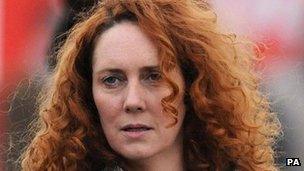Leveson Inquiry: Rebekah Brooks asked to give evidence
- Published
Rebekah Brooks has been asked to appear before the Leveson Inquiry.
The former News of the World editor, who has not previously given evidence to the hearing, has applied for "core participant" status.
This is granted to people who have a significant interest in the hearings or may face criticism.
Meanwhile, the inquiry has heard how the News of the World's crime editor attended the arrest of convicted murderer Levi Bellfield.
Journalist Lucy Panton issued a written statement in which she said she accompanied the Met on Bellfield's arrest in November 2004.
He went on to be convicted of a series of attacks and murders on women, including that of 13-year-old Milly Dowler.
In the statement, Ms Panton outlines her reasons for attending Bellfield's arrest.
She said: "I had been invited by the Met to join them after I had picked up from police sources, (in the generic sense) that there was increased activity on the inquiry.
"I was told nothing about the operation, but asked not to publish any information we had. On the day of his arrest, I was allowed along with a photographer to witness it."
Ms Panton also revealed in her statement how the Metropolitan Police's former counter-terrorism chief, John Yates, was a guest at her wedding, saying he was among "many" police officers at her marriage to a Scotland Yard detective.
But she said Mr Yates also attended the wedding of another crime reporter, Jeff Edwards, formerly of the Daily Mirror.
Ms Panton described Mr Yates as one of her "working friends".
Ms Panton was arrested in December as part of Operation Elveden, on suspicion of making corrupt payments to police officers. She was later bailed and has not been charged.
Champagne claim
The inquiry into press standards has previously heard how Ms Panton was told by a news editor to "call in all those bottles of champagne" to get inside information about a terrorist plot from Mr Yates.

Rebekah Brooks has applied for core participant status at the Leveson Inquiry
But Ms Panton said this was just "banter" from one of her bosses.
She said: "There were no bottles of champagne. I think he was putting pressure on me to get a story.
"I would call that banter. It's a way that people spoke to each other in our office.
"I think they hoped that we would be able to ring these people up and bring in exclusives every week. The reality is they know that doesn't happen, unfortunately, otherwise we would have had bigger and better crime stories than we did.
"My recollection of this is that I did phone Mr Yates, and I don't believe I actually got to speak to him. That was the reality, week in, week out."
The inquiry has also previously heard that former Met assistant commissioner Andy Hayman spent £47 on a bottle of Veuve Clicquot champagne while drinking with a female News of the World journalist at the Oriel restaurant in Chelsea on 1 February 2007.
Ms Panton said she is "confident" she was not that reporter.
Police unease
She also said Mr Yates and Mr Hayman were "not so forthcoming" as some of her other police sources were.
"As a crime reporter you would hope that all your contacts were more forthcoming than they actually were," she added.
Meanwhile, Ch Supt Derek Barnett, of Cheshire Police, who is also president of the Police Superintendents' Association of England and Wales, told the inquiry that police officers have become more nervous about talking to journalists.
This, he said, was as a result of the recent scrutiny of officers' relationships with the media.
He said in a written statement: "Understandably, my members talk of a heightened sensitivity in their dealings with the media.
"Many are 'sticking to the facts' and some are seeking to avoid contact altogether.
"If we are not careful there is a risk that due to fear of being misunderstood officers could 'close ranks' on the media."